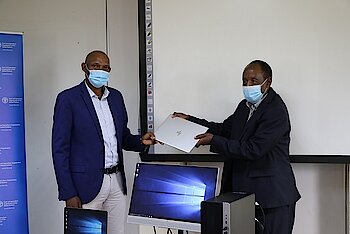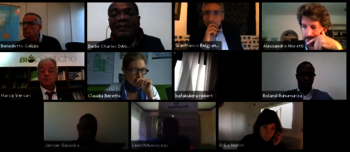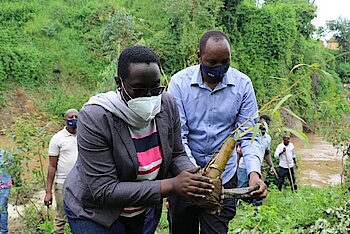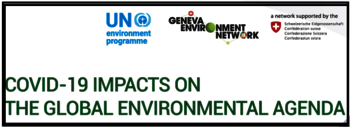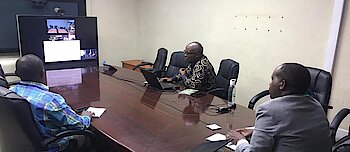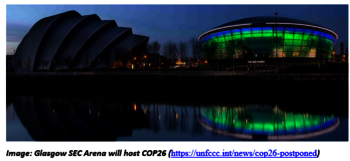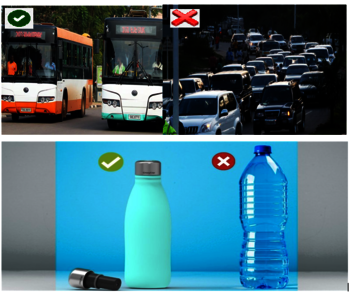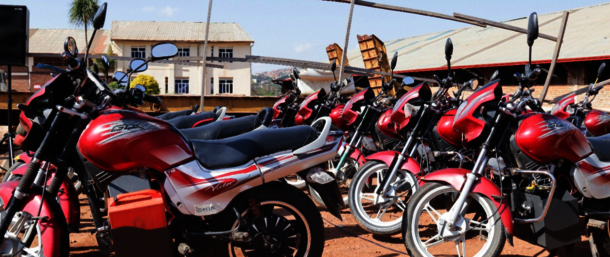
Retrofit Electric Motorcycles Project; Another step towards emission reduction
The Greenhouse gases emission inventory report of 2015 indicated that the vehicles (that burns the fossil fuel) emit emissions at 13% of the total national emissions. In 2018, the number of registered motorcycles were 112,404. This implies how much emissions generated from vehicles contribute more emissions on national total emissions. without mitigation intervention (it is referred as Business as usual) it is expected to grow.
Rwanda has pledged to cut emissions at 38% by 2030, in which electric mobility is one of the key climate actions to reach that end. In that regard, on June 09, 2021 Kigali, the Rwanda Environment Management Authority (REMA) partnered with a private local company, Rwanda Electric Mobility (REM Ltd) and jointly launched a Retrofit Electric Motorcycles Project as a pilot phase in the city of Kigali, with the financial and technical support from UNDP Rwanda through the Poverty Environment Action for SDGs (PEA) Project.
This comes after the Government of Rwanda has established the incentives for supporting the easy transition to the e-mobility.
As part of effort in emission reduction, this project aim to accelerate the transition from petrol-fuelled motors, which accounts from more than 80% of the total motorcycles in Rwanda, to electric ones.
Donald Rukotana Kabanda, the CEO REM Ltd explained that retrofit e-motors will generate more economic benefits than conventional ones. “The retrofitted e-motors are equipped with two batteries, which may be also portable. One full charge costs Rwf 900 and covers 50km of a trip while one litre of petrol costs more than Rwf 1000 and covers 25km. This means that a retrofit e-motor-taxi operator will save more than Rwf 100 per charge compared to petrol-fuelled motor-taxi,” Kabanda elucidates.
This retrofitting is planned in a period of six-month pilot phase, 80 motorcycles will be retrofitted. Thereafter, retrofitting services will be available to motorcycle owners across capital Kigali on a relatively affordable cost
From this project and other in pipelines, we can rest assured that the target set in Nationally Determined Contributions are feasible and can be achieved. Slowly but surely more and more this will also help to achieve Rwanda’s target to become a carbon neutral economy by 2050.
Topics
More posts
REMA receives computing equipment provided by FAO to enhance Greenhouse Gases inventory
Rwanda Environment Management Authority (REMA) has received computing equipment that will be used for enhancing the Greenhouse Gases (GHG) national…
Rwanda-Italy Investors and entrepreneurs discussed how to explore Green Investment opportunities
This webinar is the third virtual dialogue that gather the Rwandan and Italian entrepreneurs, investors and institutions for exploring the green…
Rwanda’s NAP Project funded by GEF was launched
The Global Environment Facility (GEF)-funded $6 million project “Building the capacity of Rwanda’s government to advance the National Adaptation…
Rwanda Pledges emissions cut of 38% in its climate action plan by 2030
Rwanda as a signatory to the Paris Agreement under which countries are due to update or communicate their 2030 emission-reduction plans, it submitted…
The Geneva Environment Dialogues discussed the impacts of the COVID-19 on the global climate change agenda
The dialogues took place on Tuesday 19 May, 2020 from 9: 00 to 9:50 on Facebook live, as way of communicating in this time of COVID-19.
this session…
Assessment of Rwanda’s vulnerability to climate change was presented to local authorities
Rwanda Environment Management Authority (REMA), with the logistical support of Ministry of Local Government (MINALOC), hold a video conference with…
Coronavirus responses proves the World can act on Climate Change
The COVID-19 pandemic has provoked a global response unlike anything we have seen before. Governments have witnessed transformational changes that…
COP 26 postponed due to the disruption caused by COVID-19
This crucial climate summit is the 26th session of conference of Parties (COP26) to the UNFCCC and it was scheduled from 9-19 November 2020 in…
Be self-accountable to tackle Climate Change and save environment
Climate change has already begun to impact our planet in more ways than we can think. Temperatures continue to rise throughout the planet and we are…
